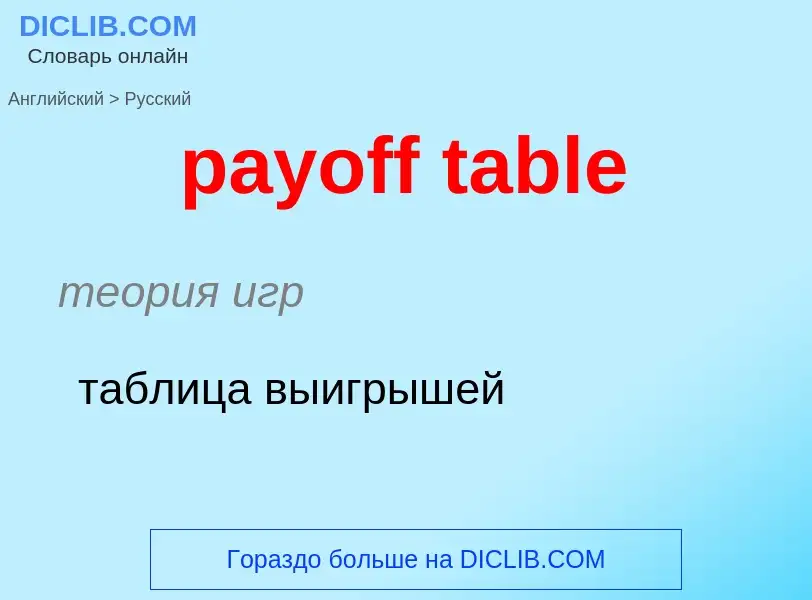Μετάφραση και ανάλυση λέξεων από την τεχνητή νοημοσύνη ChatGPT
Σε αυτήν τη σελίδα μπορείτε να λάβετε μια λεπτομερή ανάλυση μιας λέξης ή μιας φράσης, η οποία δημιουργήθηκε χρησιμοποιώντας το ChatGPT, την καλύτερη τεχνολογία τεχνητής νοημοσύνης μέχρι σήμερα:
- πώς χρησιμοποιείται η λέξη
- συχνότητα χρήσης
- χρησιμοποιείται πιο συχνά στον προφορικό ή γραπτό λόγο
- επιλογές μετάφρασης λέξεων
- παραδείγματα χρήσης (πολλές φράσεις με μετάφραση)
- ετυμολογία
payoff table - translation to ρωσικά
теория игр
таблица выигрышей
2) время выплаты
3) отдача, вознаграждение, результат
4) т. игр выигрыш; функция выигрыша
5) взятка
- payoffs compared with the costs
- payoff from promotional expenditures
- bilinear payoff
- continuous payoff
- convex payoff
- expected payoff
- foreign payoff
- game payoff
- polynomial payoff
- rational payoff
- vector payoff
Ορισμός
Βικιπαίδεια
The Big Payoff is a daytime and primetime game show that premiered on NBC in 1951, and ended its network run on CBS in 1959. It had a brief syndication revival in 1962. NBC used The Big Payoff to replace the 15-minute show Miss Susan starring Susan Peters, which had gone off the air in December 1951.
Over its eight-year run plus syndication, the show had three hosts. The first was Randy Merriman (from 1951-1957), who left after claiming that CBS was in breach of his contract. Bob Paige took his place from 1957-1959. He was followed by a short stint by Bert Parks (1959), after which CBS removed the show along with all of its other quiz shows out of abundance of caution; it stated it could not ensure the shows were produced honestly in the wake of the quiz show scandals of the late 1950s.
Contestants were selected from men who mailed in letters explaining why the women in their lives deserved prizes. The men were asked four questions (delivered on a silver tray by "Question Girl" Susan Sayers) in order to win prizes like a mink coat or a vacation. Late in the network run, the format changed to three competing couples playing a guessing game. The couple with the highest score answered the Big Payoff question. For the 1962 revival, there were only two couples.
On Tuesdays, the format changed to the "Little Big Payoff" in which children sent in a letter in which they voiced the reason that they should appear. Four questions were asked, and prizes awarded for each correct answer.
Winning contestants (other than the children) had the opportunity to answer one final question. Getting this question correct, the individual was awarded the "big payoff" of a mink coat or a trip to Europe, or both. Bess Myerson modeled the mink coat and escorted the contestants on stage.
The theme song was "A Pretty Girl Is Like a Melody" by Irving Berlin, and the sponsor was Revlon.

